Bayer Leverkusen vs Roma: Xabi Alonso’s Men 49 Games Without Defeat and Counting…
The treble dream and the streak of 49 games straight without a single defeat continued when Alonso’s men grabbed an equaliser in stoppage time from the jaws of the Giallorossi in Bayer Leverkusen vs Roma.
It’s not a matter of “if,” but it became a matter of when they would turn out the score. That’s how Xabi Alonso transmitted his “never give up” attitude to his boys, so they could keep believing until the referee whistle announced the end of the game. Two goals in the last ten minutes secured a spot in the Europa League final at the Aviva Stadium in Dublin, Ireland.
Bayer Leverkusen in the first leg displayed a fascinating tactical show, which resulted in a two-goal lead. Xabi Alonso had the upper hand over Daniele De Rossi at the Olimpico. Roma, with their new way of playing under the management of their legend, appeared to need more time to effectively apply De Rossi’s instructions. The final product seems to be a little far away from reality at this time of the year, but the future is bright.
Heading to the clash, De Rossi took three men out of the lineup he picked up at the home leg. Evan Ndicka replaced Chris Smalling with mainstay Gianluca Mancini in the backline. Angelino came in for Rick Karsdorp to act as the third left centre-back, and Sardar Azmoun played next to Romelu Lukaku due to Dybala’s injury against Juventus. On the other side, Xabi Alonso made three changes from the away clash. Andrich made way for Exequiel Palacios. Adam Hložek took the place of Florian Wirtz. Jeremie Frimpong returned to his wingback position to allow Jonas Hofmann to play in the attacking midfield spot.
Tactical Tweaks of Xabi Alonso & Daniele De Rossi in the First Half:
Bayer Leverkusen started their offensive proceedings by targeting the free space vacated by Adam Hložek, coming deep, and dragging Mancini with him. Here, the Czech professional’s work without the ball allowed him to run down the evacuated space and receive the pass from Amine Adli. Jeremie Frimpong was attempting to collect the cutback that Hložek had played in the meantime by attacking the box.
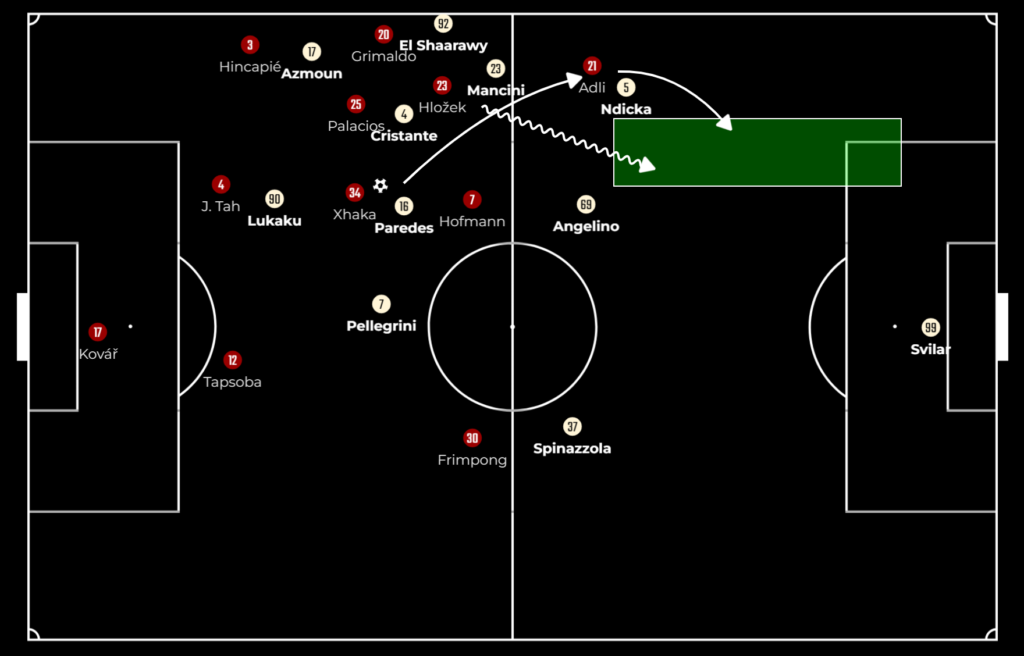
Alonso’s men were settled in a 5-3-2 shape out of possession. This formation had Hofmann and Adli in the first line while Xhaka, Palacios, and Hložek shifted across based on the circulation of the ball to prevent Roma’s first buildup line from progressing to the next phase. Daniele De Rossi’s side formed a 3-1-6 shape, with Spinazzola or Angelino alternating to drop out to the left next to Ndicka and Mancini. El Shaarawy pushed on, with Cristante and Pellegrini moving inside, ahead of what became a single pivot, Paredes. Romelo Lukaku and Sardar Azmoun acted as the central threats; one of them took place between Ndicka and Mancini, and the other between Ndicka and Angelino.
When the goalkeeper was involved in the buildup, Roma’s centre-backs alongside him, and both wingbacks (El Shaarawy acted as a right wing-back) held the touchline. In front of them, Paredes and Cristante or Pellegrini worked in close proximity as double pivots. This setup created a numerical superiority in the hosts’ first third against Alonso who pressed with five players up top. Daniele De Rossi, involving six outfield players and the goalkeeper in the construction phase, helped his team regain its shape in case Bayer Leverkusen succeeded in cutting the ball off.
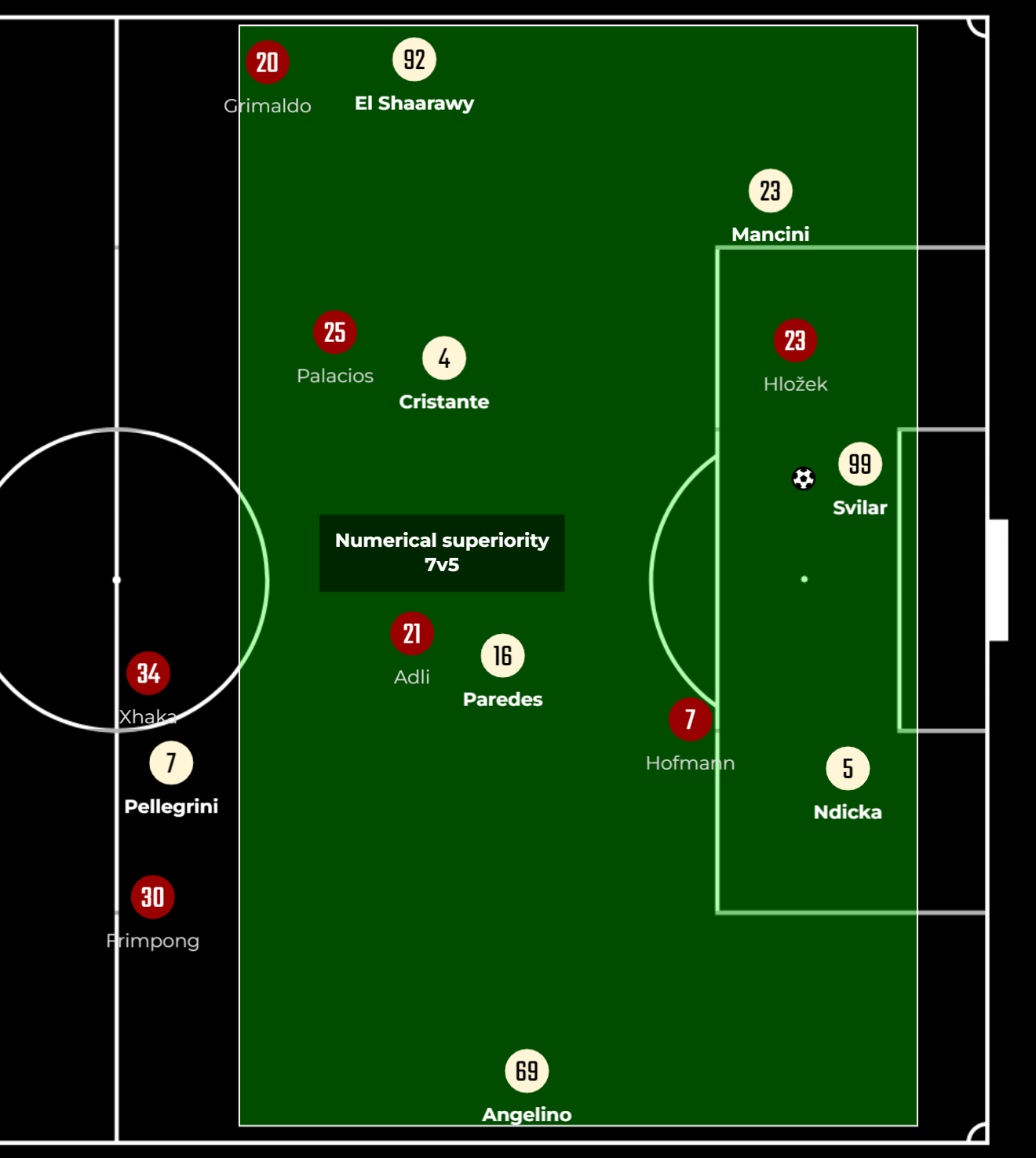
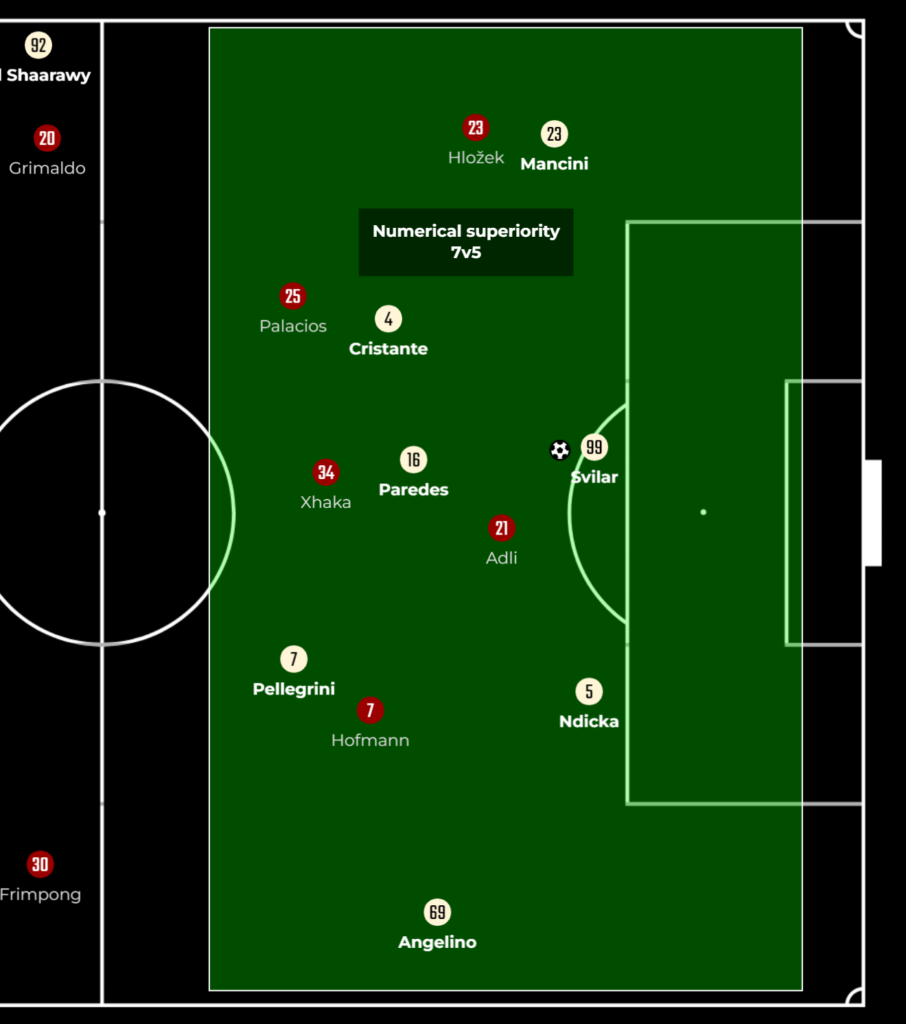
Spinazzola, Angelino, and Pelligrini played on the left side of the pitch. De Rossi opted for such a choice to take advantage of the trio’s interchanges and rotations and generate overloads on that side of the field. The numerical advantage had been engendered due to the narrow second line of Leverkusen. So, the Roma trio benefited from the space and time Hofmann had to take to be able to shift across to neutralise the numerical plus.
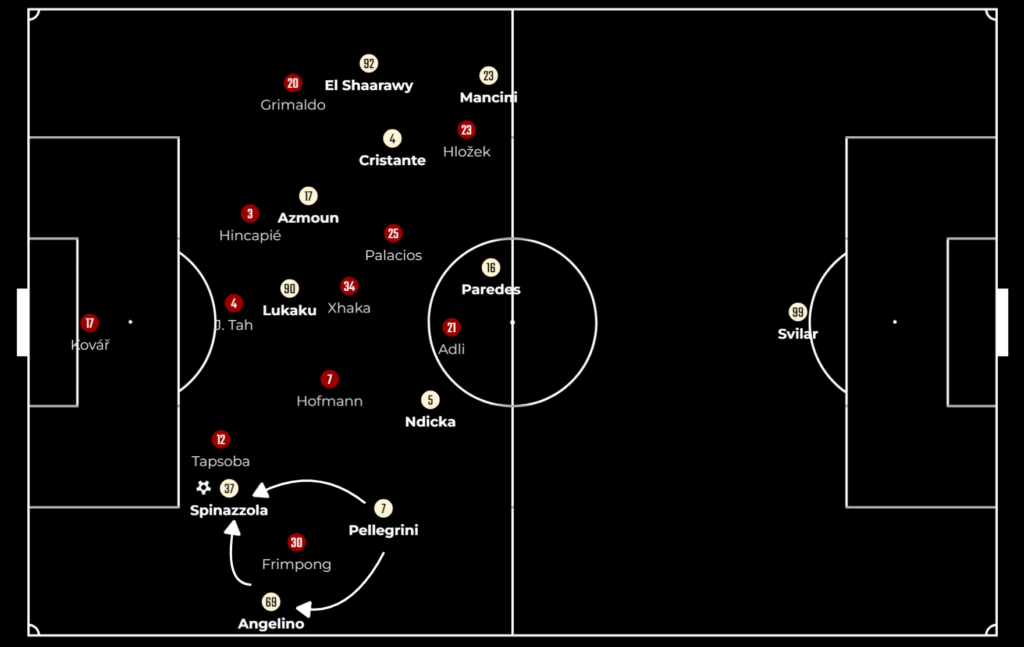
By taking advantage of that, one of the three was able to play a cross or switch the ball to the other side, where Cristante worked an early cross to Pellegrini, whose header Matěj Kovář denied.
Leverkusen tried to hurt Roma on the counter, relying on central quick passes, Hložek dropping deep, and Frimpong and Hofmann switching positions to enable the latter to work a short cross. However, the hosts’ clinicality was lacking.
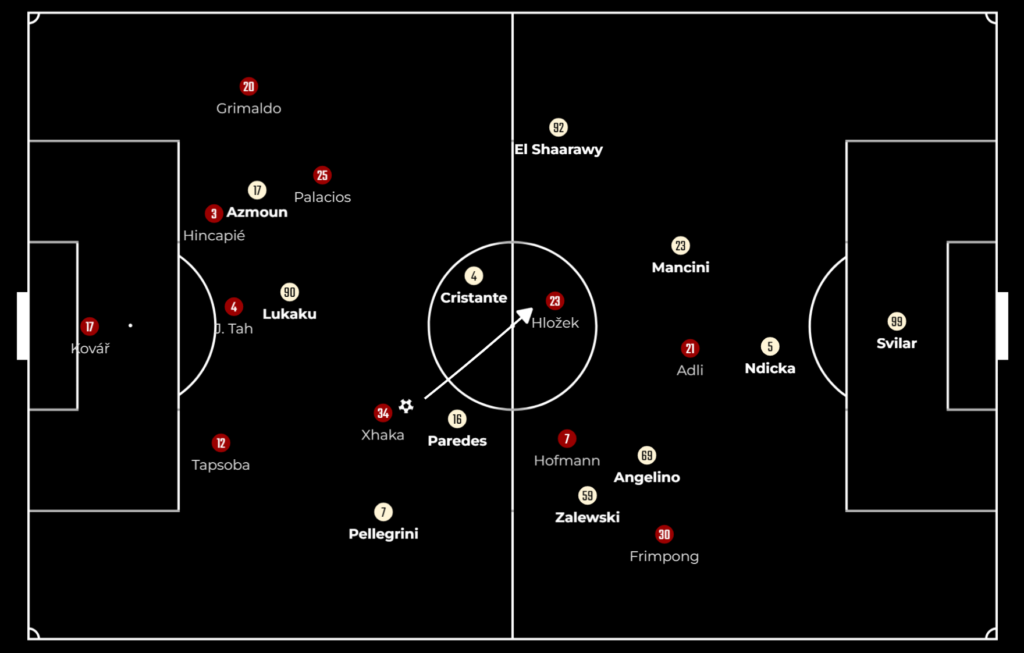
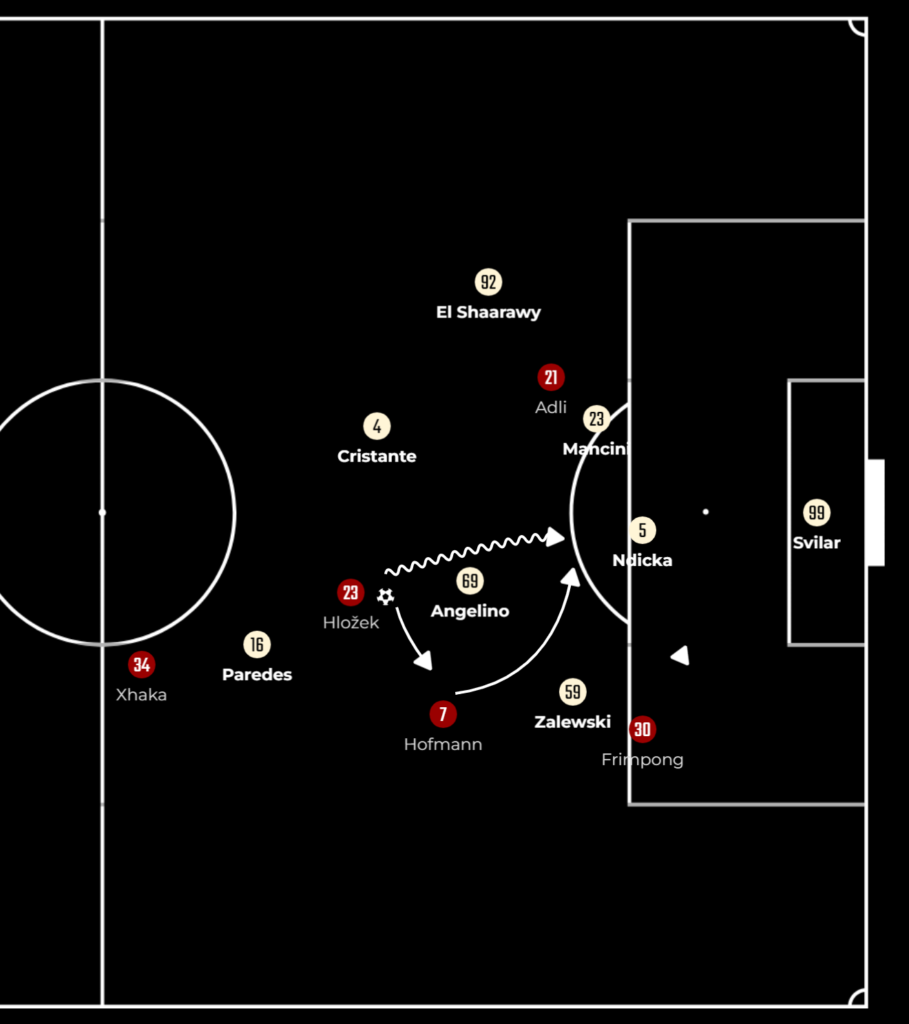
Adding to that, Alonso’s men counted on long balls, like in the first leg, due to Roma’s man-marking strategy. Bayer Leverkusen targeted one of the front-line players coming deep to lay the ball down and create an artificial transition.
Similar to the hosts out of possession, Roma set up in a 5-3-2 shape to close down all playing options and match Bayer Leverkusen’s number in the front line, however, Alonso’s wingbacks, especially Frimpong were able to handle Giallorossi’s wide defenders in 1v1 situations. Not only that but Bayer Leverkusen relies on wide players’ overlaps and runs down the channels to receive the pass behind the back of Roma’s wingbacks and work a cross or a cut-back toward the box.
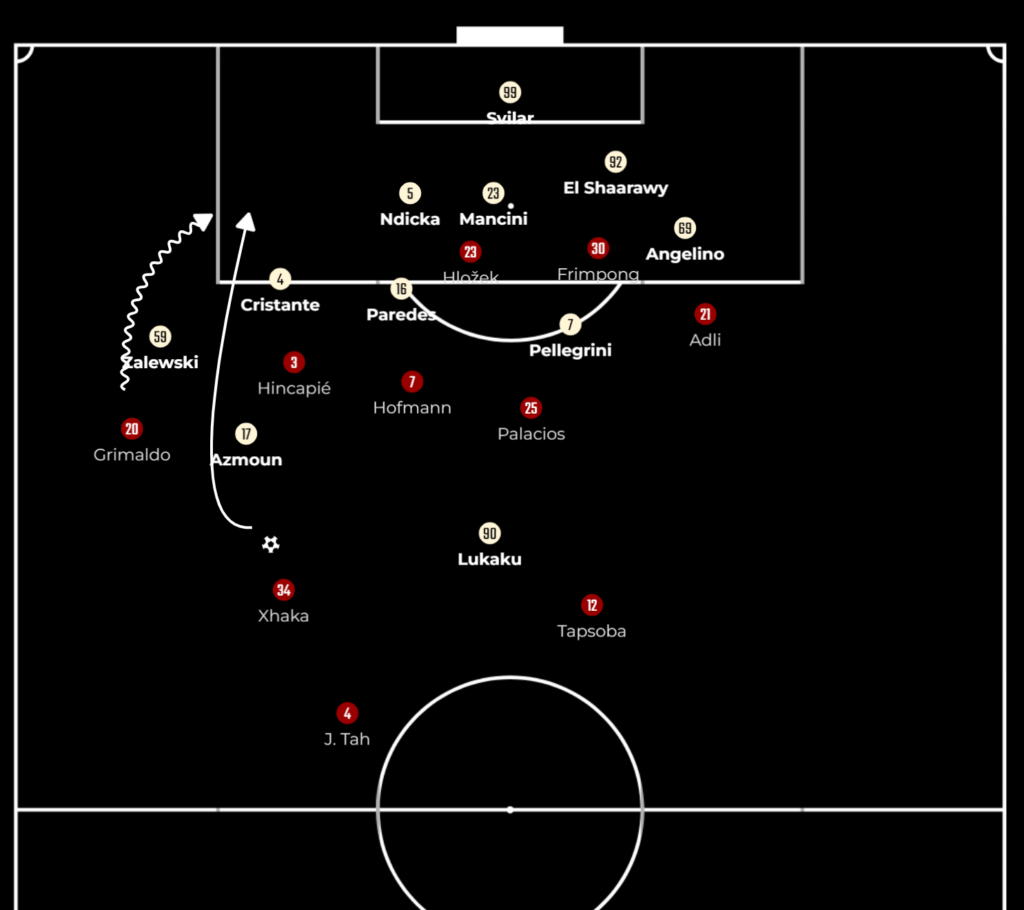
After Spinazzola picked up an injury and was subbed for Zalewski, Roma settled in their half and waited for the right moment to counter. Nevertheless, they attempted to construct their attacks from the back but they faced Bayer Leverkusen’s high press, which forced them to go wide, where Alonso’s boys set their trap to drive Angelino to play the wrong balls. The hosts have been able to regain the ball and generate quick turnovers but nobody has been successful in putting the ball in the back of the net.
In the first half, Bayer Leverkusen didn’t play as aggressively as in the first leg. They treated the clash in parts based on the scenario and the circumstances of the play. Still five minutes until the end of the first half, Leverkusen got back to their 5-3-2 mid-block, allowing Roma to circulate the ball. As aforementioned, it took too long for Hofmann to shift across and prevent Roma’s wide players from bringing their ideas to the ground.
Angeliño exploited that by working a cross towards Lukaku. In the middle of the process, Jonathan Tah pulled Azmoun from his shirt in the forbidden spot, offering the visitors a chance to lead the score. Leandro Paredes took charge of the penalty and put the ball in the middle of the rectangular thing.
Second-half Adjustments
Roma bounced between counter-attacking and building up from the back progressively. When they picked out the second option, Daniele De Rossi’s men took advantage of the numerical superiority in the first phase. The positions were alterable as Paredes dropped back next to the goalkeeper and Ndicka. Mancini and Angelino pushed on in the fullback spots while Cristante and Pellegrini acted as double pivots.
Once Svilar shows signs of starting the process, Bayer Leverkusen’s front five players shrink around Roma’s midfielders to prevent the central progression and the return’ option of the ball to the goalkeeper. However, Pellegrini instantly worked the ball over to Mancini and then to El Shaarawy, who dragged Grimaldo with him.
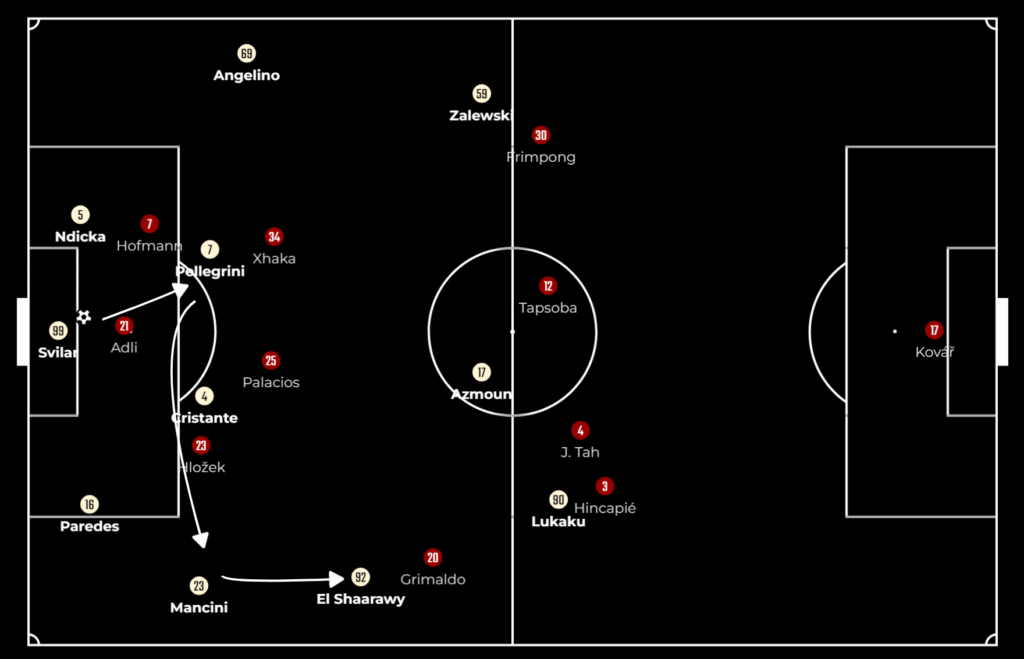
The aim of the process was to free Paredes and enable him to play the ball to Lukaku. The Belgian striker’s great ability to hold the ball up made him flick the ball to Mancini to switch the play to the other side.
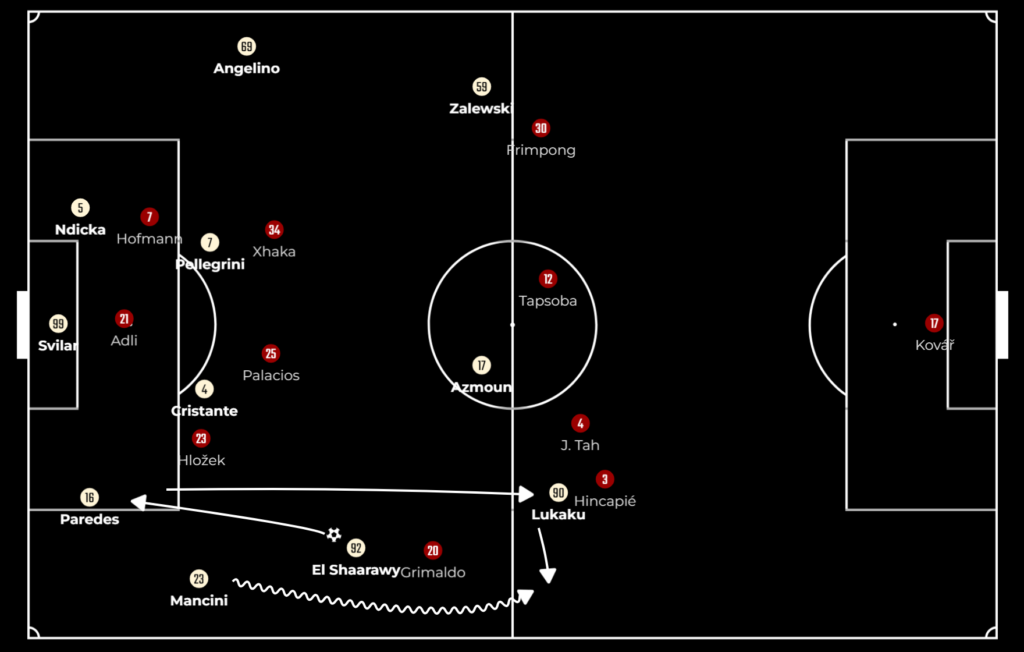
In possession, Alonso’s men tried to create numerical superiority (4v3) by taking advantage of Roma’s players’ hindsight, to combine and exploit the space by having a runner down there to cut back for players coming behind.
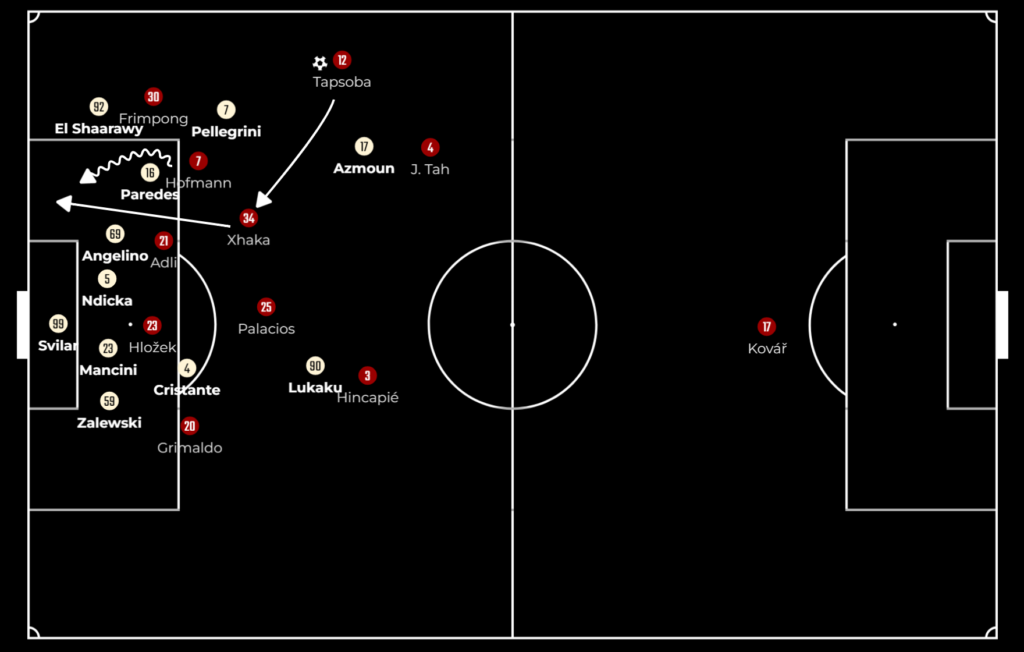
After Roma realized the gap, Bayer Leverkusen’s men often Xhaka, Hofmann, Adli, and Frimpong were able to manipulate Roma’s markers by circulating the ball until the space and the runner appeared to unleash their attacks. Also, Bayer Leverkusen’s attacking midfielders usually came deep in the inside channels pulling out with them Roma’s defenders Angelino and Mancini to evacuate the space for Adli to deal with the situation.
Roma and Bayer Leverkusen set up in a 3-2-5 shape in the late buildup, and both defended with a 5-3-2 formation. Unlike the first leg when Hincapié was proactive enough to predict the pass and jump over his man between the lines, Daniele De Rossi played with two strikers Lukaku and Azmoun in the front line pinning the hosts’ defenders. That allowed Cristante to receive between Leverkusen’s lines and pick out Azmoun who tried his luck with a shot outside the box but Kovář handled it successfully.
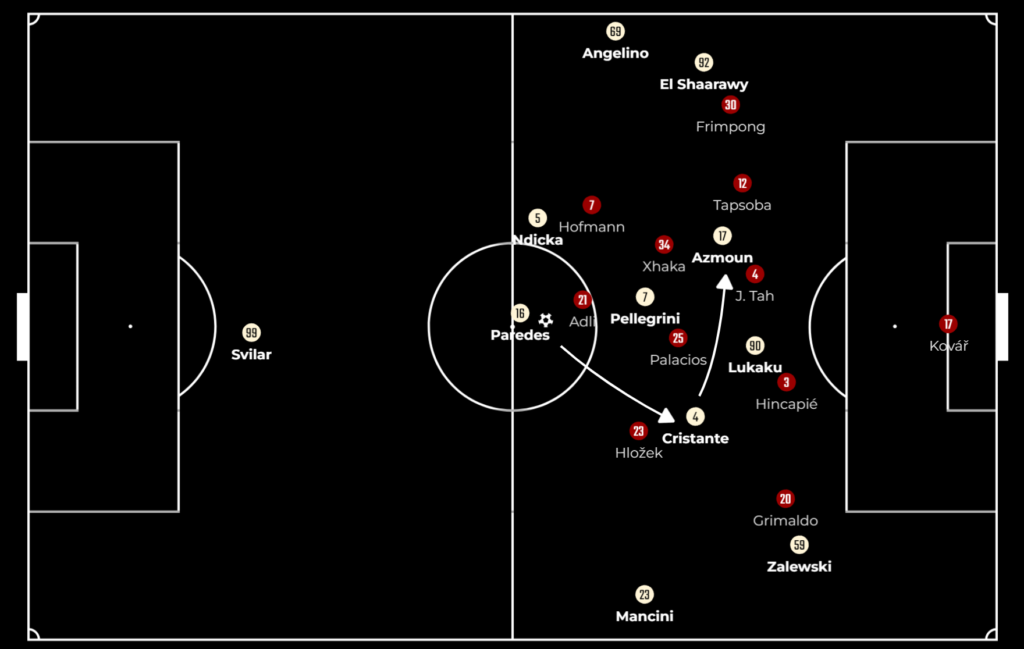
In the end, Bayer Leverkusen earned their qualification for the final based on what they showed in terms of flexibility, and versatility in the way of playing, attacking, and defending in both legs. Xabi Alonso proved again he’s no slouch of a coach and he is destined for greatness among the elites. The Spaniard advanced to his first European final in the dugout hoping to lead his team lifting the trophy in the final.
Daniele De Rossi seems to be on the right path to take Roma to the next level: competing for Italian glory. However, there are a lot of efforts to be made from all sides: the coach, the players, and the sporting officials of Roma. The Giallorossi need recruitment in multiple positions to take the team forward in the next few seasons.


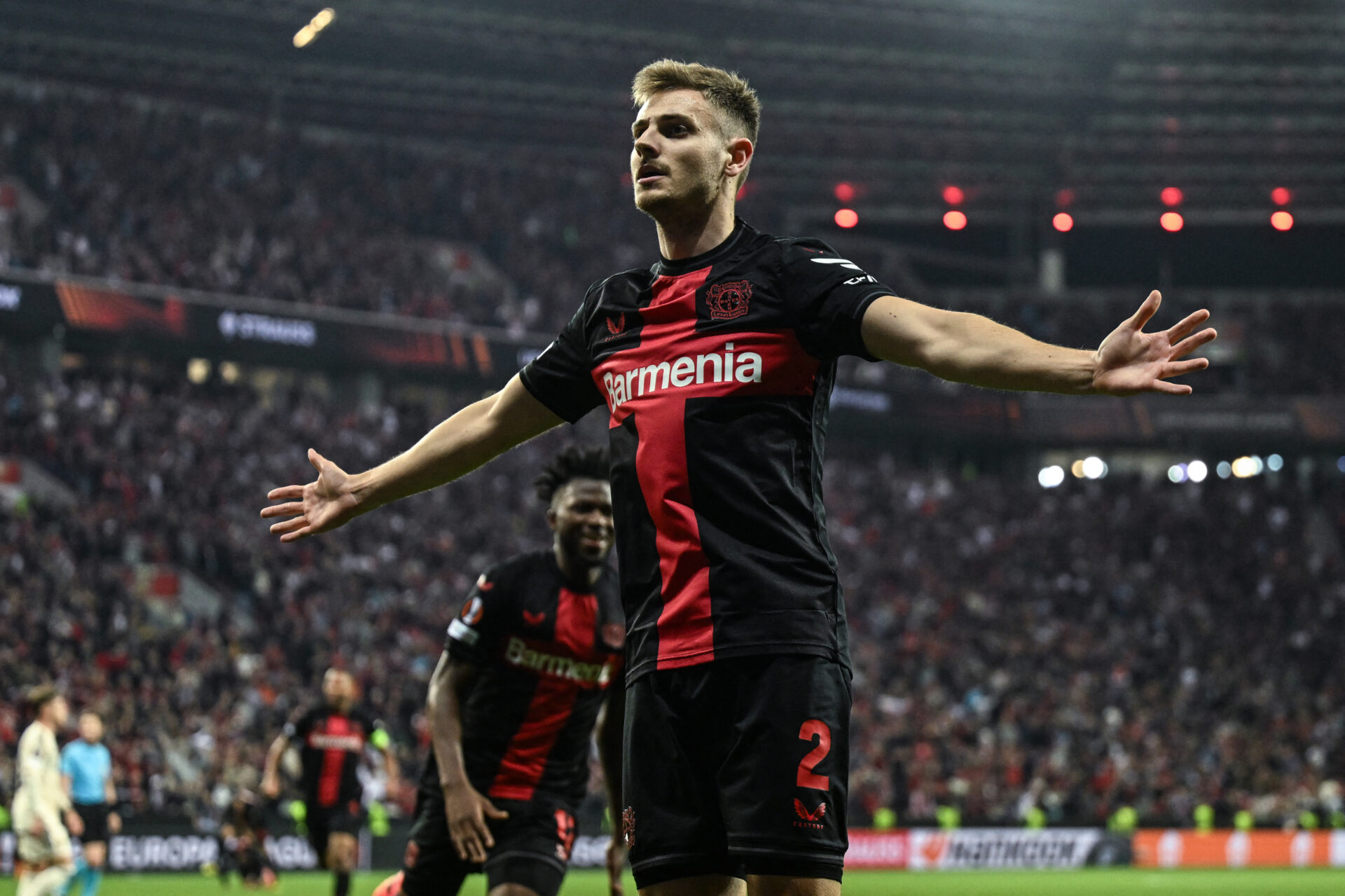
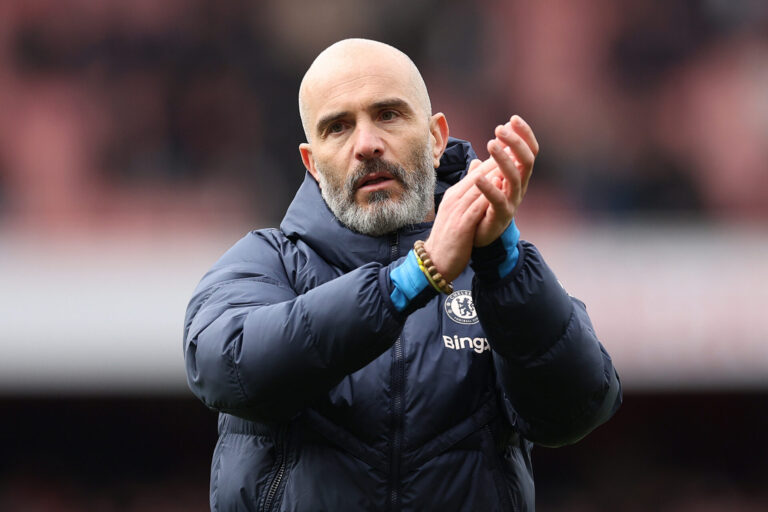
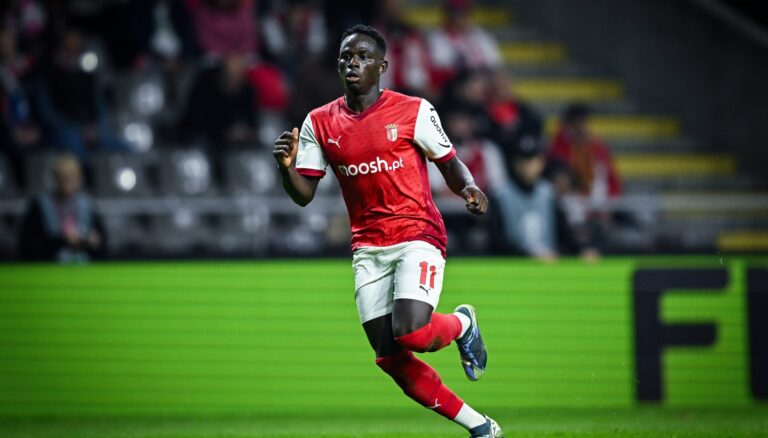


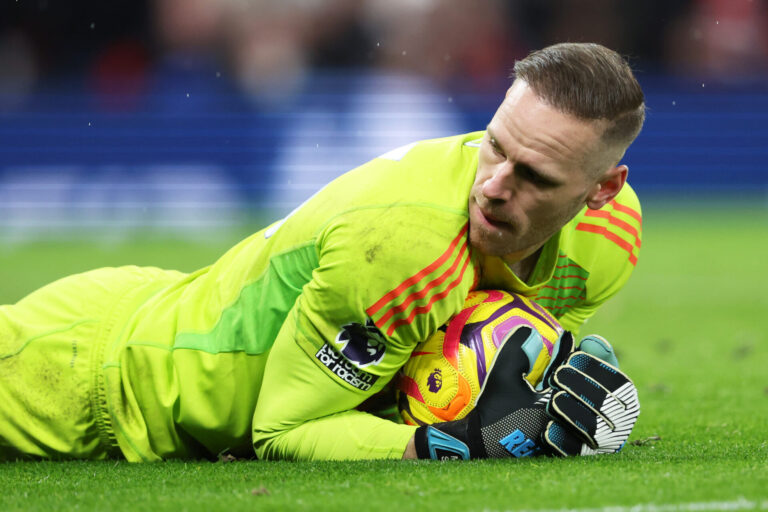
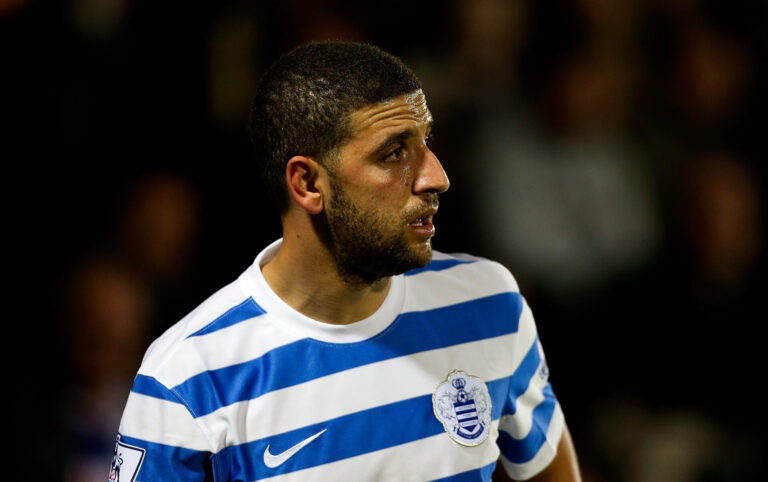
One Comment